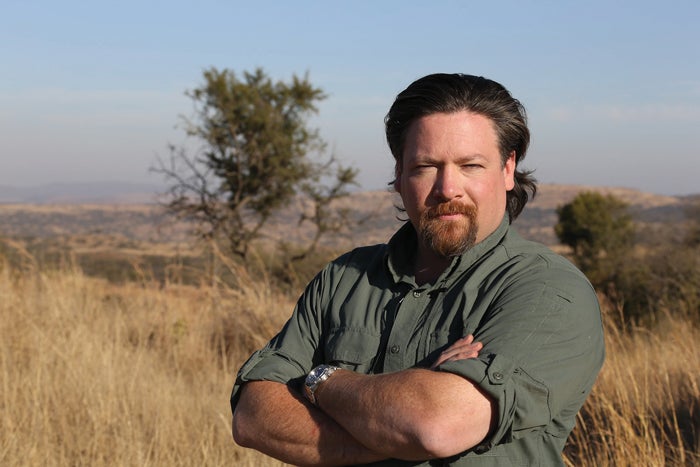‘Helping the planet:” Luke Dollar’s path to Catawba College
Published 12:00 am Thursday, July 25, 2019

- Submitted - Dr. Luke Dollar in South Africa on a lion project for the National Geographic Wild Channel. "Go see the new Lion King movie this summer," he advises.
Catawba College
Luke Dollar is on the road. A lot.
As chairman of the department of environment and sustainability at Catawba College, he promotes the college to high school students interested in the environment all over the state — and elsewhere. He represents Catawba almost weekly in front of students, teachers and parents across the country, in addition to his regular teaching duties on campus.
Last year, he gave 45 keynote speeches, classroom presentations and media interviews at 28 venues across eight states.
This promotional work comes two years into his Catawba career and stems from his passion for the environment and sustainability program.
“We have created a dynamic, growing program that is its own magnet for the best and brightest students,” said Dollar.
Currently, roughly one in every 11 day students is majoring or minoring in environment and sustainability, and two-thirds of admittances into the program chose Catawba last year.
“When we think about all the options and competing institutions, that is an incredibly high yield,” he said. “If we get prospective students on campus, in our Center for the Environment, interacting with our fantastic students and faculty, and out on Catawba’s 189-acre, on-campus ecological preserve, they’re hooked.”
With undergraduate, graduate and PhD degrees from Duke, Dollar is not your typical college professor.
He spent much of his childhood days in the office with his dad, who was dean of students and a chemistry professor at a junior college in Alabama.
Saturday mornings, however, were devoted to TV — but only “Wild Kingdom” and “Wild America.”
He went to Duke because he learned it had a lemur center, his original interest, but a trip to Madagascar in late high school changed his directions.
“A predator ate my homework,” he said with a laugh.
The predator was the rare fosa, the largest carnivore on the island. The fosa is a catlike animal unique to the forests of Madagascar and threatened because of habitat loss.
Both the fosa and the island captured Dollar as nothing else had. From 1999 to 2005, he spent half or more his year abroad, mostly in Madagascar doing conservation work, research and education, helping economic development and building schools. He logged almost a decade of calendar time there since that first trip in 1994 and has been taking undergrads abroad for conservation work since 1999.
This summer, he led his second Madagascar Study Abroad Summer program for Catawba students, marking his 25th year making that trip.
“A single lifetime impact is what one person can achieve, but every student who graduates doubles that for each of our faculty members,” he said. “I can spend 40 years helping the planet, or our department can collectively produce dozens of students a year dedicated to helping the planet.
“The first step is to give students facts facing the global environment,” he said. “We want to put tool after tool in their tool kits so that they can go out in the world and fix whatever they can. It makes sense in strategy and war. And make no mistake. We are in a war to save our planet.”
As an explorer with the National Geographic Society, Dollar is an expert in carnivore ecology, habitats and preservation. Before coming to Catawba, he served as program director for the society’s Big Cats Initiative and conservation program from 2009 to 2017. The initiative has funded more than 115 field-based grants worldwide.
He also serves as an adjunct professor in Duke University’s Nicholas School of the Environment, with which Catawba’s environment and sustainability department has a 3-2 agreement enabling Catawba students to receive both their bachelor’s from Catawba and master’s from Duke in just five years.
The Catawba program is remarkable, Dollar said, as it offers individualized attention as well as a customized learning experience. In 2018, Catawba students delivered more than 30 independent research presentations at the North Carolina Undergraduate Research and Creativity Symposium. Catawba was second overall in the conference in number of student research projects presented.
In terms of percentage of student presenters as a proportion of the student body size, no institution in the state came anywhere close, with Catawba leading that metric by several times more.
“That speaks to our strength and dedication to empowering our students,” Dollar said. adding that the program offered an opportunity for students to “do the right thing.”
“Our graduates have the facts, compassion, drive, skills, discipline and determination to make their dreams a reality and have an impact on our world,” Dollar said. “I want their own paths to be outrageously adventurous and fulfilling. Catawba is exactly where I want to be and our students are exactly who I want to be mentoring.”



